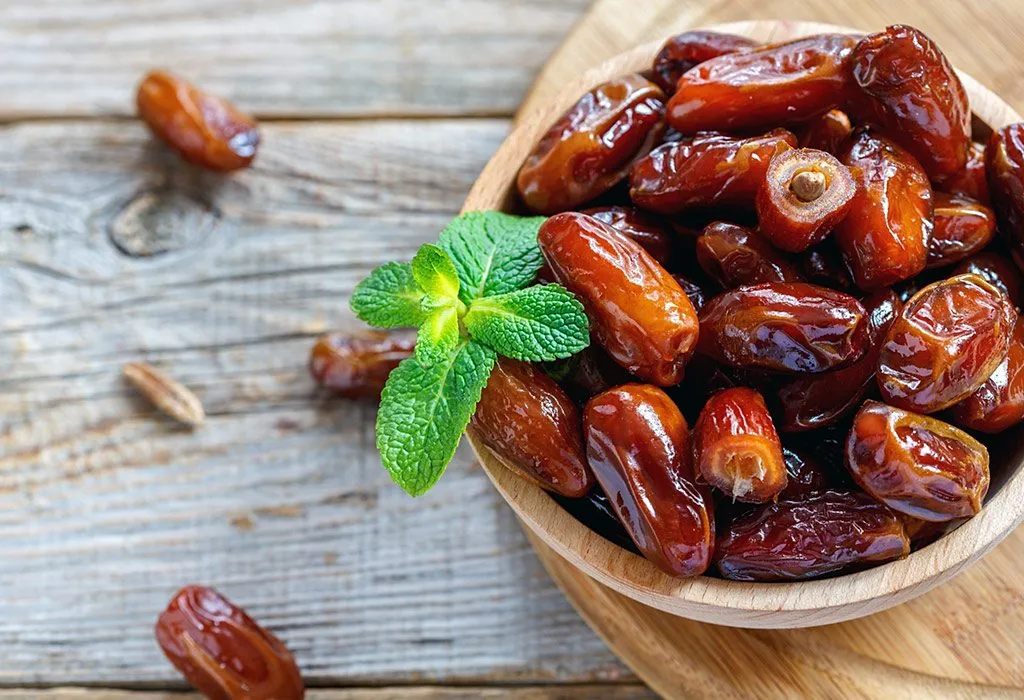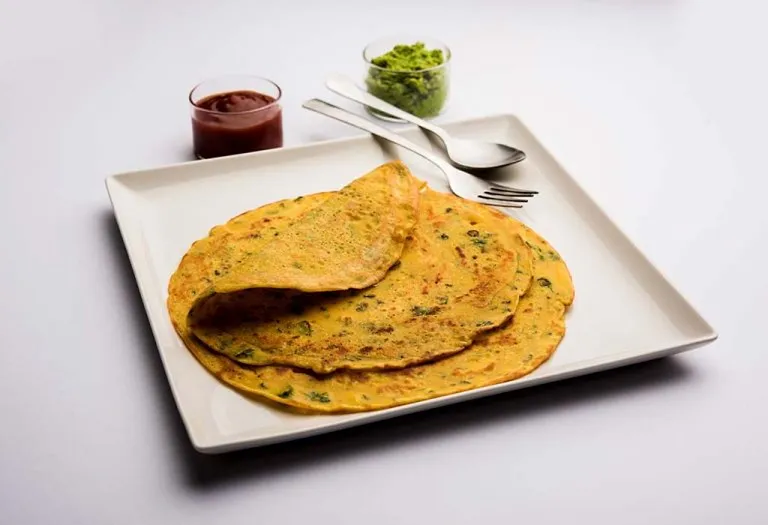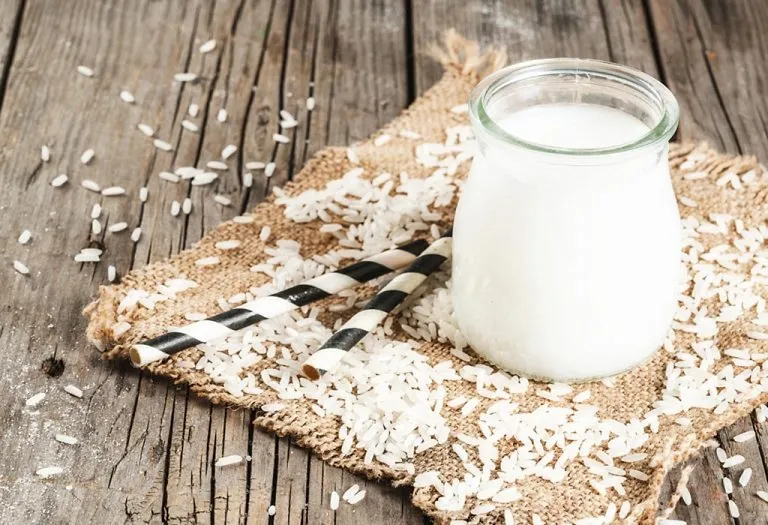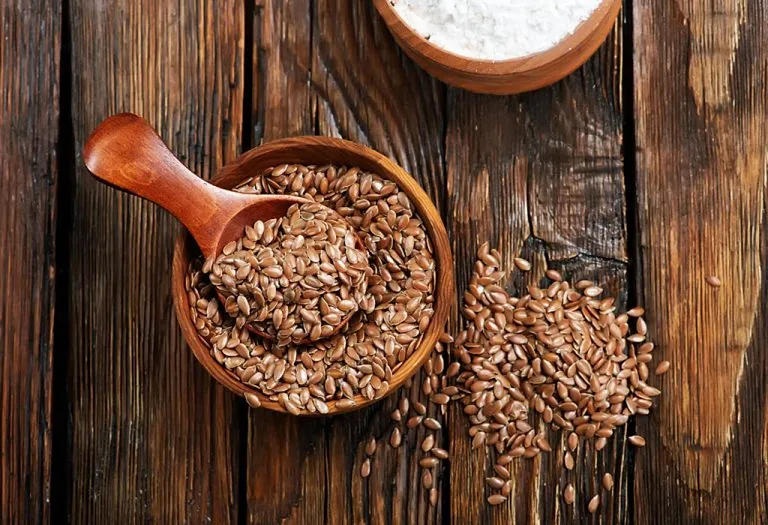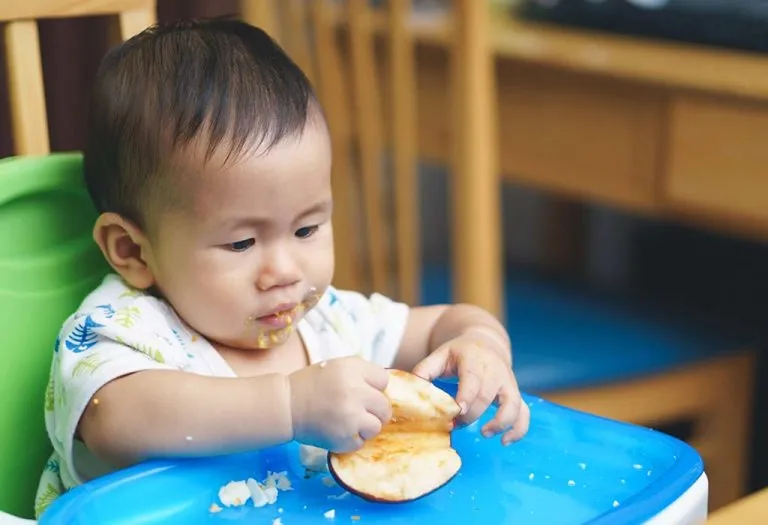Dates for Babies: Nutritional Value, Benefits and Precautions

- Nutrition Facts and Study About Dates
- Are Dates Good for Babies?
- When to Introduce Dates in Your Baby’s Diet?
- Benefits of Dates for Infants
- Side Effects of Dates on Babies
- How Many Dates to Give Babies Per Day?
- Precautions to Take When Giving Dates
- How to Give Dates to Babies?
- Can We Give Dates to Babies in Any Other Form?
- Dates Powder for Babies
- Dates Syrup for Babies
- Dates Palms for Babies
- Easy and Healthy Date Recipes for Baby
- FAQs
Dates are packed with energy and are a great food item to include in your child’s diet when they start on solids. They are a good source of minerals like iron, calcium, sodium, phosphorus, magnesium, potassium and zinc. They also contain vitamins like thiamin, riboflavin, niacin, folate, A, B6 and K.
Dates for babies are also a good source of sugar and fibre. Simple sugars, including fructose and dextrose, present in ripened dates, provide instant energy.
These nutrients balance the diet of a growing baby and supplement the nutrients from the mother’s milk. Here is a quick guide on everything you must know about feeding dates for your little one.
Nutrition Facts and Study About Dates
Apart from being rich in essential nutrients, dates are also known to have therapeutic properties. Studies indicate that at least 15 minerals are present in dates, including cancer-preventing ones like selenium, which also helps boost immunity. In addition, dates have 23 types of amino acids and unsaturated fatty acids; they are low in cholesterol and saturated fat, contain anti-inflammatory properties, and are rich in antioxidants.
In terms of nutritional value, 100 gms of ripe dates have the following amount of nutrients, minerals and vitamins:
| Nutrients | Amount |
| Folate | 24.5 μg |
| Niacin | 0.51 mg |
| Pantothenic Acid | 0.52mg |
| Pyridoxine | 0.24 mg |
| Riboflavin | 0.02mg |
| Thiamin | 0.05 mg |
| Vitamin A | 149 IU |
| Vitamin K | 4.93μg |
| Iron | 0.90 mg |
| Magnesium | 14.34mg |
| Phosphorus | 33.88mg |
| Zinc | 0.44 mg |
| Beta Carotene | 89 Ug μg |
| Lutein | 23 Ug |
| Zeaxanthin | 86.34μg |
A small amount of sulphate is added to increase the shelf life of packaged dates and other dry fruits to prevent mould formation. However, babies with asthma or sulphate allergy should avoid these sulphate-covered dates. If your baby has asthma, consult your paediatrician to analyse how safe it is to feed dates to your little one.
It is important to note that different types of dates have different nutritional values. Ajwa dates are abundant in dietary fibres, lipids, minerals, flavonoids, and proteins. Medjool dates are larger and sweeter. Deglet Noor dates are thought to be superior for cooking. Sayer dates have a high sugar content, and honey dates are natural sweeteners.
Are Dates Good for Babies?
Can dates be given to babies? This is a question that most mothers ask. Dates are ‘heart healthy’ and quite nutritious because of which they can be introduced into an infant’s diet, as these nutrients help in the baby’s growth. Dates add the essential nutrients required for a baby’s growth that milk alone may not be able to provide.
When to Introduce Dates in Your Baby’s Diet?
Providing the right nutrients and striking a balanced diet are extremely important for your baby’s steady growth and development. Therefore, once your baby gets older, you should supplement their feeds with foods like dates that address his essential nutrient requirements. Babies can begin to eat dates when they are around 6 months old or after eating solid or semi-solid food.
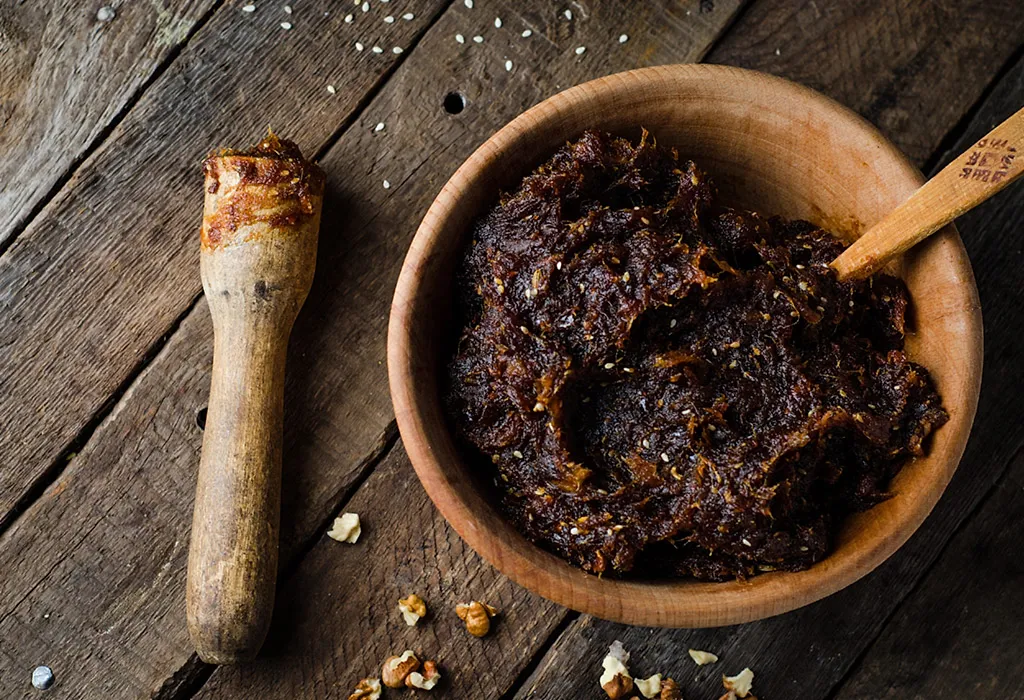
Ensure you do not introduce dates when your baby is just starting on solid foods. Dates should be introduced in small portions to test how the baby reacts to this new food. They can be introduced with other fruits-one at a time.
Use steamed and not dehydrated dates to let the baby chew easily. You may puree or mash dates for ease of consumption.
Benefits of Dates for Infants
Dates are nutrient-rich and packed with a good variety and amounts of minerals and vitamins, which are essential for your baby’s growth. Dates help your baby’s growth in the following ways:
1. Brain Development
Potassium helps brain growth and development, and a fair amount of this nutrient is present in dates, thus enabling a baby’s overall cognitive development.
2. Preventing Indigestion
Dates help eliminate parasitic organisms and help cultivate friendly bacteria in the intestines. This helps prevent intestinal problems– a common concern amongst babies.
3. Liver Protection
Infants are quite susceptible to contracting viral and bacterial infection, which in turn hurts the liver; these contribute in a high occurrence of liver conditions like jaundice, typhoid and hepatitis that babies fall prey to. However, dates have liver-protecting properties and therefore is a great preventive dietary item to include in your baby’s menu.
4. Remedy for Gastric Ulcers
Some children can also suffer from acidity and ulcers. Dates have properties to help alleviate some symptoms and can be added to regular medical treatment recommended by your doctor. However, consult your paediatrician before you use dates as a remedy to treat gastric ulcers.
5. Stronger Teeth
Ripened dates can be given to teething infants for better dental development. Dates help strengthen gums and make teeth grow stronger and faster. Chewing ripe dates can be a good dental exercise that teething babies may benefit from.
6. Nourishing During Fevers and Smallpox
Dates assist in speedy recovery if your baby is recovering from fever or smallpox. This is because of the presence of rich mix of nutrients that dates offer. You can mix dates with milk too.
7. Remedy for Dysentery
Babies can develop dysentery due to bacterial infection in the large intestine. This can be controlled by feeding them sweet date pulp.
8. Relief from Constipation
The high amount of dietary fibre present in dates adds bulk to the stool and promotes water absorption. This assists in a smooth bowel movement for babies.
9. Soothing Fever
Fevers are a common occurrence among children. Dates help eliminate some of the discomforts like acidity and diarrhoea that come along with the risings body temperature. Grounded date mixed with milk is extremely nourishing and also assists in a speedy recovery from fever.
10. Improves Haemoglobin Levels in Blood
Dates have high iron content. This helps increase the haemoglobin count in your baby’s red blood cells. It also promotes healthy hair growth and nourishes the skin.
11. Rich in Vitamins and Minerals
Dates contain essential vitamins and minerals, including potassium, magnesium, calcium, iron, and phosphorus. These nutrients are vital for developing strong bones and teeth and healthy muscle and nerve function. The high fibre content in dates also helps with digestion and can prevent constipation in babies. Also, dates contain vitamin B6, which helps boost babies’ brain development and cognitive function.
12. Boosts Energy
Dates are an excellent energy source, making them a perfect snack for active babies. They are a rich source of carbohydrates, which provide the body with energy to perform various activities. The natural sugars in dates are easily digested and absorbed by the body, making them an ideal food for babies who need a quick energy boost. Dates are also a great food to include in your baby’s diet if they are suffering from anaemia or low iron levels, as they are a rich source of iron.
13. Natural Sweetener
As a natural sweetener, dates make a healthy alternative to processed sugar. They have a low glycemic index, meaning they won’t cause a spike in blood sugar levels. This makes them an excellent food for babies starting on solid foods and needs a bit of sweetness to make them more palatable. Pureed dates can be added to oatmeal, yoghurt, or other baby foods to sweeten them naturally without adding refined sugar.
Side Effects of Dates on Babies
Dates are a delicious fruit commonly consumed by people of all ages. However, when it comes to babies, parents often wonder if dates are safe for their little ones to eat and if they can have any side effects. For babies who are at risk of developing diabetes or have existing blood sugar issues, it is important to consult with a paediatrician before introducing dates into their diet. Also, dates can pose a choking hazard for babies, especially if they are not pureed or mashed properly. Let us see some side effects of dates on babies:
- Babies can be allergic to dates, which can cause symptoms such as itching, hives, swelling, and difficulty breathing.
- Dates are high in fibre, which can cause diarrhoea in some babies.
- Dates are high in natural sugars, leading to tooth decay if not properly cleaned from the baby’s teeth.
- Some babies may experience gastrointestinal discomfort, such as bloating or gas, after eating dates.
- Dates may cause cross-reactivity in people who are allergic to pollen. In such situations, consult your baby’s doctor.
How Many Dates to Give Babies Per Day?
Start with one date and other fruits to allow your baby to recognise and develop a taste for dates. It can be mashed with other fruits or steamed. You can start with one date a day and slowly increase to 2 or 3 per day.
Your baby will benefit from the following nutritional benefits from one full date:
66 calories, 1.6 grammes of fibre, 0.22 mg of iron, 15 mg of calcium, 167 mg of potassium, and trace levels of niacin, vitamin A, and folate.
Precautions to Take When Giving Dates

Babies’ digestive systems are fragile, and the sudden introduction of new foods should be avoided. Babies cannot be expected to chew on hard textured dates early on. Give steamed dates or mashed in small pieces to avoid any choking hazards.
- Feed small chunks of dates to avoid the risk of choking.
- Feed only sweet ripened dates with a sweet pulp. Unripened dates are not recommended as they contain tannins which may cause a stomach upset.
- Do not introduce dates immediately when you begin solid foods for your baby. Introduce in small portions and see how the baby enjoys it, before increasing the quantity.
- Opt for seedless dates to start with.
- Watch out for any allergy within the first 24 hours after introducing feeding dates to your little one.
- Consult your paediatrician before introducing dates.
- Check dates for quality. Wash and clean them thoroughly as they do not have skin or an outer shell to keep them germ- and dust-free.
- Raw dates can only be given once your baby can chew well.
- Dates tend to stick to the baby’s teeth as they are sticky in texture. It can lead to forming bacteria that cause tooth decay by producing acid. Ensure your baby drinks water after eating dates as it helps clean their teeth and get rid of any date remains present in their mouth.
How to Give Dates to Babies?
Start with mashed or steamed dates and void-boiled ones as boiling washes away all the nutrients. Give raw dates only when your baby can chew.
You can also include dates in your baby’s diet in the following ways:
- Add dates to milk and make a milkshake.
- Use it as a topping for yoghurt or make a smoothie.
- Dates can be baked into muffins.
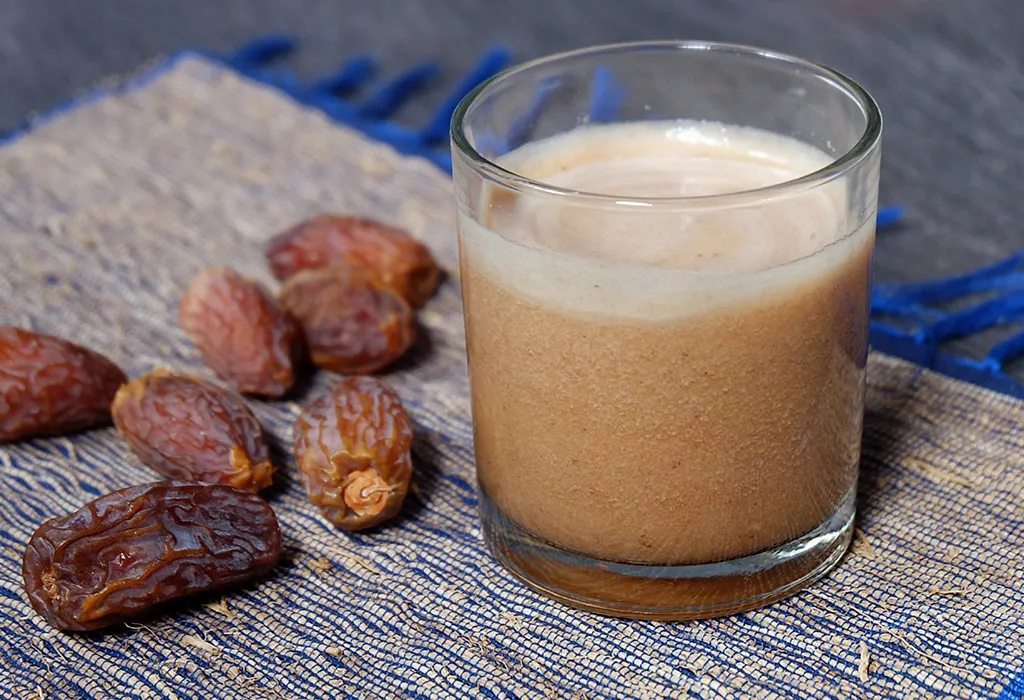
Dates are packed with nutrients that help babies grow. Dates can also help reduce discomfort during fever. You can feed dates as a puree, shake or juice. Consult your doctor and introduce your child to this nutritional and tasty food.
Can We Give Dates to Babies in Any Other Form?
Dates can be given to babies in various forms other than whole dates. This is particularly helpful for babies who are just starting on solid foods or have trouble chewing. When taken alone or with other herbs, date fruits are said to have various therapeutic benefits. Pureeing or mashing dates can make them more manageable for babies to eat and incorporate into their diet. Dates can also be a natural sweetener in homemade baby food recipes. In this way, dates provide numerous health benefits and add a delicious flavour to baby food. In this response, we will explore different ways dates can be prepared for babies.
Dates Powder for Babies
Dates powder is a convenient and easy way to introduce the nutritional benefits of dates to babies. Dates are a good source of energy, fibre, vitamins, and minerals and can help support a baby’s growth and development.
- To make date powder for babies, you can start by removing the pits from the dates and then drying them in a dehydrator/oven or sundry them.
- Once the dates are dry, you can grind the dates into a fine powder using a food processor or blender.
- To boost their nutritional value, date powder can be added to various baby foods, such as purees, cereals, or yoghurt.
- It can also be a natural sweetener in homemade baby food recipes.
Dates Syrup for Babies
Dates syrup is delicious and nutritious to add sweetness to your baby’s diet. Instead of using sugar or honey, which can be harmful, dates syrup provides natural sweetness and a range of essential vitamins and minerals to aid your baby’s healthy development.
- To make date syrup for babies, you can start by soaking the pitted dates in water for a few hours or overnight.
- Then, blend the dates and water until they form a smooth paste.
- Next, strain the mixture through a cheesecloth or fine mesh strainer to remove any solids, and transfer the liquid to a saucepan.
- Heat the liquid on low heat until it thickens and gets a syrupy consistency.
Dates syrup can be added to various baby foods, such as oatmeal, yoghurt, or smoothies, to add a natural sweetness without the harmful effects of refined sugar. It can also be used as a topping for pancakes or waffles.
Dates Palms for Babies
Date palms are safe for babies only once they have started consuming solid foods after attaining six months of age. Date palms can also be choking hazards for babies. Hence, it’s always better to consult your paediatrician before introducing date palms in your baby’s diet. Here are some ways you can give date palms to your babies:
- Remove the pit and chop the pulp in very small, fine pieces for your kid to nibble on.
- You can cook the pulp in cookies or muffins.
- Puree the pulp and add it to any sweet baby food recipe.
Easy and Healthy Date Recipes for Baby
Here are some easy recipes using dates for your babies:
1. Date Juice
Ingredients
- 1 cup pitted and chopped dates
- 4 cups water
- Optional: cinnamon, vanilla extract, or other spices for flavouring
How to Make
- Put dates in a small bowl and let them sit for 30 minutes after covering them with warm water.
- Drain the water after the dates have soaked
- Mix in a high-speed blender with filtered water and lemon juice.
- Blend for 45-60 seconds. Add more water if required.
- You can even make a date paste and store it in the freezer.
2. Date and Oatmeal Puree
Ingredients
- 1/2 cup rolled oats
- 1/4 cup pitted and chopped dates
- 1 cup water or breast milk/formula
How to Make
- In a small saucepan, combine the oats and water/milk.
- Bring the mixture to a boil and then reduce the heat to low.
- Cook for 5-7 minutes or until the oats are soft and the liquid has been absorbed.
- Remove from heat and stir in the chopped dates.
- Let the mixture cool and then blend or mash until smooth.
- Serve warm or at room temperature.
3. Date and Banana Mash
Ingredients
- 1 ripe banana, mashed
- 2-3 pitted and chopped dates
- 1/4 cup plain Greek yoghurt
How to Make
- Mix the mashed banana, chopped dates, and Greek yoghurt in a small bowl.
- Use a fork or immersion blender to mash or blend the mixture until smooth.
- Serve immediately or store in an airtight container in the refrigerator for up to 2 days.
4. Date and Sweet Potato Mash
Ingredients
- 1 medium sweet potato, peeled and diced
- 2-3 pitted and chopped dates
- 1/4 tsp ground cinnamon
- 1/4 cup water or breast milk/formula
How to Make
- Steam or boil the sweet potato until it is tender.
- In a small bowl, mix together the chopped dates and cinnamon.
- Mash the cooked sweet potato with a fork or immersion blender until smooth.
- Stir in the date and cinnamon mixture and the water/milk, adding more liquid if needed to achieve the desired consistency.
- Serve warm or at room temperature.
5. Date Puree
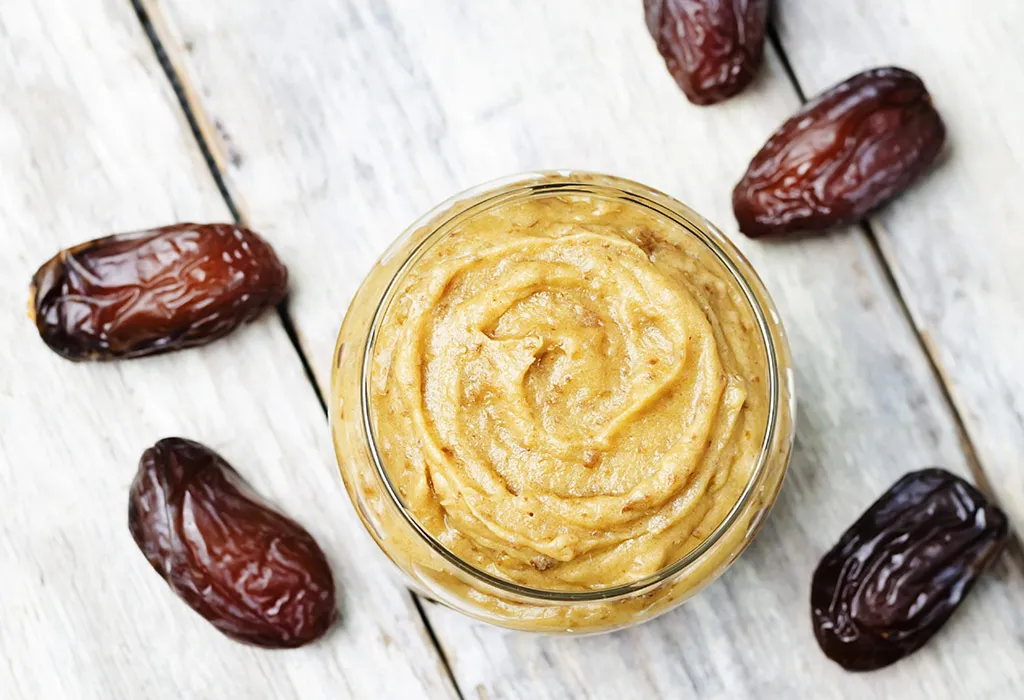
Ingredients
- Dates
- Water
How to Make
- Soak the dates overnight in water.
- Remove them from water and keep the water aside.
- Make the date puree for babies in a blender or mixer.
- Add the soaked water kept aside to the puree and make a thick paste.
These dates recipes for babies are easy to make and can be incorporated into their daily meals. This is the most power-packed item amongst dry fruits for babies and is very helpful in absorbing vitals helpful for the baby’s development and growth.
FAQs
1. Are There Any Specific Types of Dates That Are Good for Babies?
Several dates are available, including Medjool, Deglet Noor, and Barhi dates. Any date can be fed to babies as long as it is prepared properly and in moderation. However, Medjool dates are often considered the softest and easiest to puree, while Deglet Noor dates are a bit firmer and have a drier texture.
2. Can Consuming Dates Prevent Anaemia in Babies?
Dates are a good source of iron and helpful in preventing anaemia. However, it’s important to note that dates alone may not prevent anaemia in babies. Other iron-rich foods,, such as meats, beans, and leafy greens, should also be included in their diet. Talk to your paediatrician if you have concerns about your baby’s iron intake, as they may be able to provide supplements to cover the iron deficiency as well.
3. Can Dates Cause Cavities in My Baby?
Sayer dates have a high sugar content, and honey dates serve as natural sweeteners, which can increase the risk of tooth decay and cavities if consumed in excess or improperly cleaned from the baby’s teeth. Any date can threaten teeth if they are not cleaned properly after eating dates or any sugary items. To reduce the risk of cavities, brushing your baby’s teeth regularly and limiting their intake of sugary foods like dates is important. After feeding them dates, you can also offer water or milk to help rinse away any remaining sugars from their teeth.
References/Resources:
1. Kwaasi. AAA, Harfi. HA, Saleh. S, et al.; Cross-reactivities between date palm (Phoenix dactylifera L.) polypeptides and foods implicated in the oral allergy syndrome; PubMed Central; https://pubmed.ncbi.nlm.nih.gov/12028116/
2. Khalid. S, Khalid. N, Khan. RS, et al.; A review on chemistry and pharmacology of Ajwa date fruit and pit; Science Direct; https://www.sciencedirect.com/science/article/abs/pii/S0924224416304435; May 2017
3. Date Fruits ( Phoenix dactylifera Linn): An Emerging Medicinal Food; ResearchGate; https://www.researchgate.net/publication/51980791_Date_Fruits_Phoenix_dactylifera_Linn_An_Emerging_Medicinal_Food; March 2012
4. Dates, medjool; USDA; https://fdc.nal.usda.gov/fdc-app.html#/food-details/168191/nutrients; January 2019
5. The Sweet Health Benefits of Dates; Cleveland Clinic; https://health.clevelandclinic.org/benefits-of-dates/
6. Rahmani. AH, Aly. SM, Ali. H, et al.; Therapeutic effects of date fruits (Phoenix dactylifera) in the prevention of diseases via modulation of anti-inflammatory, anti-oxidant and anti-tumour activity; PubMed Central; March 2014; https://www.ncbi.nlm.nih.gov/pmc/articles/PMC3992385/
7. Ghinni. S, Umer. S, Karim. A; Date fruit (Phoenix dactylifera L.): An underutilized food seeking industrial valorization; ScienceDirect; https://www.sciencedirect.com/science/article/pii/S2352364616300463; March 2017
Also Read:
Giving Jaggery to Babies
Giving Brown Rice to Infants
Poha Recipes for Babies and Kids



